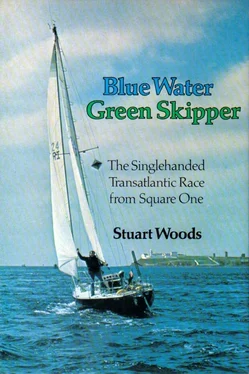I don’t think anyone who knew Lizzie McMullen, however slightly, went to bed with dry eyes that night, and I was more deeply affected than at any time since my grandfather had died. It had been a bad day.
THURSDAY. Everything began to gather momentum. There were three events scheduled for competitors: a lord mayor’s reception at midday, a competitors’ briefing in the early afternoon, and a dinner that evening. In between, I was at a dead run. The hydraulics engineer from Southampton turned up bright and early with the new pump. I spent the rest of the morning running errands and arrived at the lord mayor’s event after the speeches. Lloyd Foster called me over to confer with Henry Williams and Colonel Jack Oddling-Smee of the committee, who agreed to accept the proposed Lizzie trophy. Liz Balcon of The Observer voiced the newspaper’s approval, and both the club and The Observer agreed to contribute a substantial amount of money to be combined with the competitors’ contributions to purchase a piece of silver. Lloyd asked me to announce the trophy at the competitors’ briefing in the afternoon and said he would accept the contributions.
I found Richard Clifford chatting with a very attractive girl and the three of us adjourned to a local restaurant for an hour to rest from the rush of the day. Richard told me that Mike had decided to continue in the race and would be at the briefing. I felt vastly relieved and very happy about that. Yves Anrys had said to me the previous afternoon, “The man’s wife is dead, that’s one problem. If he doesn’t do the race he will have two problems.” I thought that described the situation very succinctly, and I was glad that Mike would not have to suffer the additional agony of missing the race. I hoped, too, that competing might have a therapeutic effect.
As we gathered at the Royal Western for a group photograph and the briefing, I found Mike, looking shattered but holding up well, told him what we wanted to do, and asked if he minded if it were announced at the briefing. He agreed readily. When we sat down for the photograph on the club’s front terrace, there seemed to be a thousand photographers, and I think most of us were a little taken aback at all the attention, not being used to that sort of thing. I was sitting somewhere near Clare Francis and the crush around us was incredible as all the photographers, as one man, rushed forward for close-ups of the prettiest skipper in the race. A lot of attention was focused on Mike, too, but this was more discreet, thankfully. We filed into the main lounge of the club and were briefed on the starting and finishing procedures; the Pen Duick class would start at twelve noon, the Gypsy Moth class at twelve-thirty, and the Jester class at one o’clock. The finishing line would be a line between the Brenton Reef lighthouse and a nearby buoy, and we were given a chart of the Newport area. A representative of the Ida Lewis Yacht Club of Newport, who was handling the arrangements at the other end, said that an effort would be made to meet as many competitors as possible. Other details were discussed, then I made the announcement about the new prize, to be called The Lizzie McMullen Perpetual Trophy, for the first multihull to finish. It would be a presentation of the competitors in the 1976 race and would be presented in perpetuity. There were a few more announcements, and we broke up to return to our boats.
Ann arrived during the afternoon, and I left her to rest at the hotel while I got back to the boat. Arriving there, I found that the replacement hydraulic unit had blown immediately upon installation, and the engineer was trying to cannibalize the old unit to repair the new one. I got the electrical engineer started on replacing the battery and rewiring the engine bay, working around the other engineer as best he could. This was a time when I had planned to be lounging in the cockpit with a glass of wine, watching everybody else panic. Instead, Yves Anrys was lounging in his cockpit, watching me panic. The handicap committee came by and had a look at Harp. I sat them down and explained as thoroughly as I could that Harp was not in her present condition a competitive half-tonner, that she was much, much too heavy for that and had larger rigging, steps on the mast and lots of other windage-making gear, such as the Dynafurl reefing. They nodded sympathetically and agreed that she would not rate as a standard half-tonner, and I felt I had made my point successfully.
I raced back to the hotel to change for the banquet, and we made it on time. The atmosphere was relaxed, and although a lot of people looked tired, as I’m sure I did, everybody looked happy. Ann got her bottom pinched by somebody who turned out to be Jerry Cartwright, an American yacht designer from Newport and a friend of Ron’s. I asked her if she wanted me to hit him, but she seemed flattered.
We sat with Yves Anrys, Max Bourgeois, and Ian Radford, with Bill Howell at the next table, so we were among friends. Jack Oddling-Smee made a gracious and amusing speech, the new editor of The Observer, the incredibly young-looking Donald Trelford, made another, and Val Howells responded on behalf of the competitors. Val had been a competitor in the first race, in 1960, and now he and his son Philip had built identical boats for the Jester class for this race. The party broke up and everybody went to get some sleep before the last full day we would have before the start.
FRIDAY. We were up at the crack of dawn and back on the boat. The two engineers were working away at it, and I sent Ann off in the car for some last-minute shopping while I worked on the boat. With the two engineers still working it was a mess, and with only a day to go.
Lizzie McMullen was buried in the family plot at the little church in the Cornish village of St. Mellion, a few miles from Plymouth. Mike Kane and I drove up, and Richard Clifford and Clare Francis were there, too. Mike McMullen bore himself in a manner which put us all to shame. “He’s taking it better than I am,” Mike Kane said.
Mike invited us back to the house after the funeral, and was everywhere, putting everybody at ease. He showed us around the place, a pair of workmen’s cottages he and Lizzie had been converting into a single house, doing all the work themselves. Only one room was completely finished, and it was heartbreaking to see, on a beautiful Cornish hillside with a view nearly to Plymouth, still another project that they had begun but would not finish together. I told Mike how glad I was that he would be sailing the race. He said, “Your telegram just about did it, you know.” I said I thought Lizzie would have been pleased, too, and Lizzie’s father, who was standing with us, agreed.
On the drive back to Plymouth, Mike Kane and I got to know each other better, and I began to appreciate the pressures he was under, over and above anything I was experiencing. He was being sponsored by the American Tobacco Company, and a crew had been sent to make a film about his project. A camera and sound crew were following him around everywhere he went; they had been in California taking shots of his home and family before he left for England, and there were the usual PR men skating him around the TV and press people, too. He was longing to be out at sea, I think, leaving it all behind.
Ann and I worked the rest of the day stowing gear and tidying up last-minute details. By early evening Harp was nearly ready. During the afternoon I met Mike Flanagan of Galloping Gael ; he came aboard, introduced himself, and asked to borrow my dinghy to do some work on the topsides of his boat. I had heard that Mike was very confident of his chances in the Jester class and wasn’t shy about it. We chatted for a couple of minutes, and he seemed a nice enough guy.
Читать дальше












